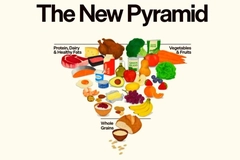August in review: Examining the MAHA leaks, IPC confirms “Phase 5” famine in Gaza

In August’s major health and nutrition industry news, we looked at the controversies stirred up by the Make America Healthy Again (MAHA) commission’s leaked report, while examining the first confirmation of famine in Gaza by the Integrated Food Security Phase Classification (IPC). We also talked with experts about challenges to the NOVA ultra-processed foods (UPFs) classification system.
In our August review, Nutrition Insight highlights some of the month’s biggest stories, including research on climate-proofing crops, debates centered on the healthiness of plant- and animal-based diets, and how menopause misinformation drives women to seek care from unverified sources.
We also looked at the latest innovations in organ-on-chip (OoC) technology, Bayer Consumer Health’s consumer-centric R&D strategy, and Brightseed’s research into the growing “bioactivist” consumer base. Monteloeder spoke with us about its upcoming webinar on the efficacy and versatility of its RelaxPLX ingredient.
Plant-based diet diversity linked to better heart and metabolic health, UK study finds
A UK-based study, using data from over 670 omnivorous adults in the National Diet and Nutrition Survey (2016–17), found that greater diversity in plant-based food intake improved cardiometabolic health. Participants who consumed a wider variety of plant foods — up to 11 types per day — included more vegetables, fruits, oils, nuts, legumes, and spices. Those with higher plant diversity exhibited better cholesterol profiles (higher HDL), lower HbA1c levels (an indicator of average blood sugar), and higher fiber intake. They also tended to follow healthier lifestyles. The research suggested that dietary variety, not just quantity, played a vital role in reducing risks of cardiovascular disease and type 2 diabetes. At the same time, a separate meat industry-funded study challenged longstanding health concerns associated with animal-based proteins.
Future of crop nutrition: Smart bacteria improve yield and quality under climate stress
Scientists developed a novel approach to food security by engineering “smart bacteria” that could reprogram crops’ responses to environmental stress in real time. The UK project, led by Northumbria, Oxford, and Leeds universities, aimed to reduce reliance on fertilizers and pesticides. The bacteria sensed plant stress signals and mimicked hormones, helping crops maintain growth under moderate stress, improving yield, biomass, and protein content. Researchers emphasized enhancing survival and nutritional quality, particularly in cereals like wheat, rice, and maize. The commercialization effort progressed via GainsBio, reimagining crop development in the field rather than traditional lab-based genetic modification. We sat down with the founder and CEO of FortiFit Global, to explore his mission to revolutionize global food security.
We sat down with the founder and CEO of FortiFit Global, to explore his mission to revolutionize global food security.
Industry expert cautions against “blanket policies” based on Nova UPF definition
We sat down with Rocco Renaldi, the secretary general of the International Food and Beverage Alliance, who cautioned against crafting global UPF policies based solely on the NOVA classification system, which lumps most packaged foods into one category without considering nutritional value. He stated that health warnings, taxes, or marketing restrictions applied across-the-board would dilute their effectiveness and discourage reformulation. The NOVA definition, he argues, creates “blanket rules” that fail to differentiate between nutritionally diverse products — an approach that can be scientifically unsound and counterproductive. Renaldi instead urged policymakers to empower consumers through education, provide incentives for healthier product innovation, and adopt more nuanced, balanced food policies. Meanwhile, research revealed that, though UPF consumption in the US has decreased, it remains a significant source of calories, with one survey finding that minimally processed diets led to better fat loss, and another paper revealing strong public support for banning UPFs in hospitals.
“Talk is cheap”: Leaked MAHA report promotes whole foods with lax regulation
MAHA’s leaked “Make Our Children Healthy Again” strategy outlined how the Trump administration intended to address chronic disease through nutrition, whole foods, and cross-agency collaborations. It emphasized voluntary industry action on additives, sodium, and sugar, avoiding stricter regulation, which drew criticism from health advocates. The plan highlighted nutrition-as-medicine programs, research into the gut microbiome, and reforms to dietary guidelines, food dyes, labeling, and infant formula standards. However, critics noted contradictions with budget cuts, workforce reductions, and SNAP attacks that threatened nutrition security. Public health experts argued the strategy favored food industry interests while undermining meaningful policy reform and protections. We also discussed the leaked draft with Mary Story, Ph.D., a registered dietitian and director of Healthy Eating Research, and the Council for Responsible Nutrition.
Bayer Consumer Health tackles energy and bone health market gaps in Brazil and Singapore
Julia McCalmont, VP of R&D LATAM and Global Vitamins, Minerals, and Supplements at Bayer Consumer Health, spoke with us about the company’s targeted solutions for energy and bone health that are tailored to local needs in Brazil and Singapore. Its Redoxon Energy offering combines B vitamins, controlled caffeine, and micronutrients to deliver sustained energy without relying on sugar or excessive caffeine. In Singapore, the Move Well formula, designed for healthy aging, pairs vitamin D3 with calcium to improve bone strength and help prevent frailty. Bayer highlighted that peak bone density occurs between ages 30 and 50, emphasizing early interventions. Through these offerings, Bayer aims to support energy and skeletal health across global populations. McCalmont also detailed the company’s consumer-centric R&D strategy. The secretary general of the International Food and Beverage Alliance, told us about the challenges of the Nova classification system for UPFs.
The secretary general of the International Food and Beverage Alliance, told us about the challenges of the Nova classification system for UPFs.
Menopause misinformation drives women to seek care from unverifiable sources
We looked at the results of a study, which warned that menopause-related misinformation has driven many women toward unverified care options, such as commercial hormone panel tests and custom-made supplements that are “unnecessary and clinically unsupported.” Published in The BMJ, the study argued that these tests have no defined therapeutic value or clear benefit over standard clinical assessment. The authors say the trend reflects the increasing commercialization of women’s health and a move away from evidence-based practices. At the same time, industry players are innovating to better support menopause-related health needs with science-backed solutions such as targeted probiotics, postbiotics, folate, vitamin K2, and other nutrients.
IPC confirms famine in Gaza for the first time, UN agencies reiterate call for immediate ceasefire
The IPC confirmed famine in Gaza for the first time, classifying it as Phase 5, the most severe level marked by extreme hunger, acute malnutrition, and preventable deaths. It projected that by the end of September, approximately one-third of Gaza’s population — around 641,000 people — will suffer from catastrophic food insecurity, with another 1.14 million in emergency conditions. Children were disproportionately affected, with over 12,000 acutely malnourished in July, and future cases expected to more than double. UN agencies urgently demanded a ceasefire to ensure unimpeded aid delivery, and the World Central Kitchen also unveiled plans to scale its meals in Gaza.
One Health world: Closing the nutrition science gap with organ-on-chip tech
Recent research explored the potential of OoC technology within the One Health framework to transform nutrition science. OoCs replicate human — and even animal — organ functions with precision, enabling studies on nutrient absorption, gut microbiota interactions, food safety, and exposure to contaminants such as PFAS and bisphenol A. We caught up with the lead experts in the study, who emphasized that these microphysiological systems offer more accurate human relevance than traditional animal models, which often fail to mirror human metabolism. While acknowledging challenges like standardization and scalability, researchers concluded OoCs could bridge major gaps in nutrition research, advancing food safety, sustainability, and health across species. We spoke with the CEO of Leaft Foods about the company’s successful commercial extraction of Rubisco, the most abundant protein on Earth.
We spoke with the CEO of Leaft Foods about the company’s successful commercial extraction of Rubisco, the most abundant protein on Earth.
Brightseed finds growing “bioactivist” consumer base is willing to pay more for actives
Brightseed research found that “bioactivists” are the largest and fastest-growing US health segment, rising to 45% of adults in 2025 from 27% in 2022. These proactive consumers view health as a “foundation,” and are willing to pay more for foods and supplements containing bioactives, and often seek products with added nutrients. Brightseed’s AI platform, Forager, helped uncover hidden plant bioactives, including 530 phytochemicals in almonds. Bioactivists are highly brand loyal, incorporate supplements into daily routines, and influence market trends. The research highlighted growing consumer demand for transparency, scientific validation, and functional benefits in health products, presenting opportunities for food and beverage companies.
Webinar preview: How RelaxPLX Delivers non-drowsy, science-backed rest and wellness
We sat down with Stephanie Guillen, the chief commercial officer at Suannutra, a subsidiary of Monteloeder, ahead of its upcoming webinar to discuss RelaxPLX, a natural sleep and stress support ingredient derived from lemon verbena (Lippia citriodora). Clinically validated, Guillen spotlighted how RelaxPLX enhances sleep quality, reduces stress, and supports emotional balance without causing drowsiness. The ingredient operates by activating GABA-A receptors and boosting melatonin production and recent studies have demonstrated its efficacy in adults and adolescents, with improvements in sleep efficiency, reduced cortisol levels, and enhanced emotional resilience. Guillen also highlighted RelaxPLX as a versatile solution for formulating non-drowsy sleep aids, mood-support supplements, and calming blends, aligning with the growing consumer demand for natural, science-backed wellness products.












